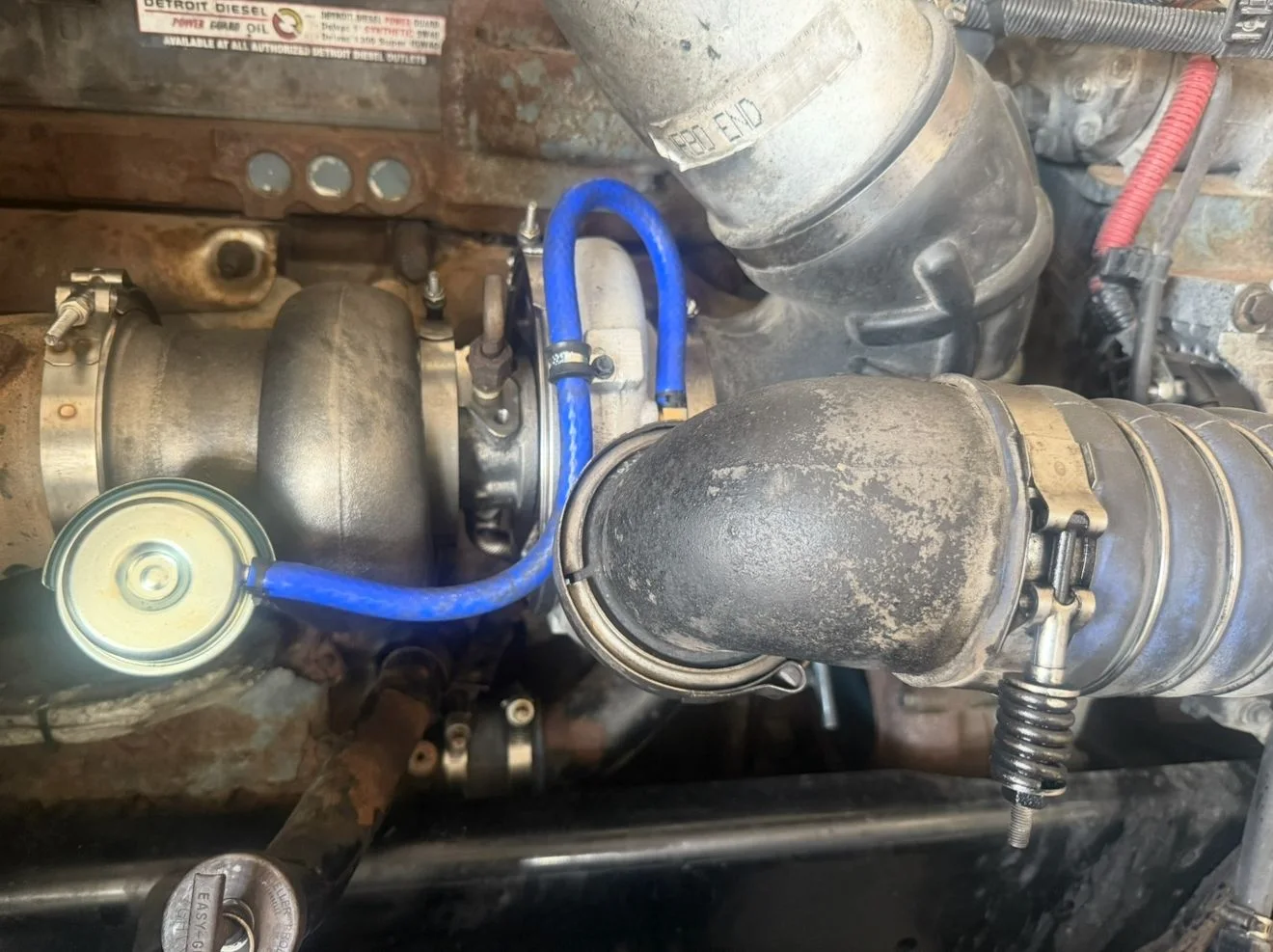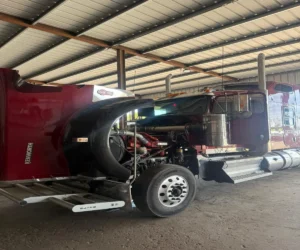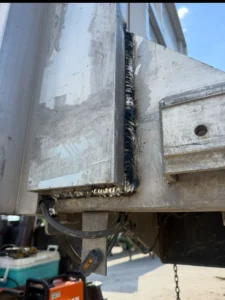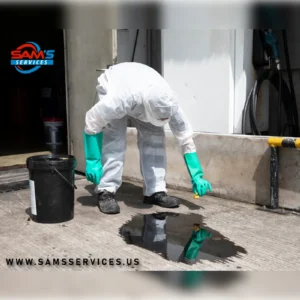
When a truck driver complains about loss of power on the road, the issue can often be traced to fuel delivery problems, boost leaks, or clogged filters. But sometimes, the root cause is much more serious — a failing turbocharger.
Your turbo is responsible for forcing more air into the engine, giving it the power and efficiency heavy-duty trucks need. When the turbo begins to fail, drivers will notice sluggish acceleration, increased smoke, or even oil inside intercooler pipes. Ignoring these signs of a failing turbo can turn a relatively manageable repair into a major engine rebuild.
At Sam’s Roadside Service Towing and Recovery LLC, we’ve helped countless truck drivers in Houston and surrounding areas diagnose and repair turbocharger problems. This guide explains the key turbo failure symptoms, why they happen, and how to get them fixed before they cost you time and money.
What We Found in a Recent Turbo Failure Case
One recent customer came to us with a complaint:
“My truck has lost power and feels sluggish when accelerating.”
After performing a full diagnostic, our technicians discovered:
Turbo intake and charge pipes were coated in oil
Oil pooled inside the intercooler piping
Exhaust side of the turbo showed oil blow-by
Boost levels were low and inconsistent
This was a classic case of turbocharger failure. The oil contamination wasn’t just hurting turbo performance — it was also threatening the charge air cooler, sensors, and intake system. Left untreated, this problem could have caused catastrophic engine damage.
Key Signs of a Failing Turbo
Wondering how to tell if your truck’s turbo is going bad? Look for these turbo failure symptoms:
1. Power Loss and Poor Acceleration
One of the most noticeable bad turbo signs is reduced power. If your truck feels underpowered or struggles to accelerate, it may not be generating enough boost.
2. Excessive Smoke from the Exhaust
A failing turbo often leads to oil leaking into the exhaust, creating thick blue or black smoke. This is not only a sign of turbo damage but also harmful to sensors and emissions systems.
3. Oil Consumption and Leaks
If you’re adding oil more often or notice oil inside intercooler pipes or intake hoses, your turbo’s seals are likely compromised.
4. Loud Whining or Siren Noise
A healthy turbo makes a faint whistle as it spools. A failing one may produce loud whining or siren-like noises, especially under acceleration.
5. Contaminated Charge Air System
Oil blow-by into the charge air system can clog intercoolers and reduce cooling efficiency, leading to higher intake temperatures and lower engine performance.
6. Check Engine Light and Fault Codes
Modern trucks may trigger fault codes related to boost pressure or airflow sensors when the turbo is failing.
Why You Shouldn’t Ignore Turbo Failure Symptoms
Delaying repairs when you notice the signs of a failing turbo can lead to:
Severe engine damage if oil or debris enters the intake
Clogged intercooler and piping, reducing performance
Premature turbocharger replacement at a higher cost
Increased downtime and expensive towing bills
Catching bad turbo signs early can save thousands in repairs and keep your truck running efficiently.
How We Fix Turbocharger Problems
At Sam’s Services, we don’t take shortcuts when it comes to turbocharger repair. Our repair process includes:
Removing the failed turbo and inspecting both intake and exhaust sides
Cleaning intercooler pipes and charge air components thoroughly
Replacing gaskets, clamps, and seals with OEM-quality parts
Inspecting sensors and intake systems for contamination
Test driving and verifying proper boost pressure before releasing the truck
This approach ensures your turbo repair is done right the first time — no surprises, no repeat failures.
Roadside Support You Can Count On
No matter the situation, our reliable roadside assistance ensures you get the help you need, fast. From breakdowns to emergencies, we’re here 24/7 to keep you moving.
Don’t Ignore Early Signs
If your truck feels down on power, smokes excessively, or you notice oil in the charge pipes, don’t wait. A failing turbo doesn’t heal itself — it only gets worse with time.
At Sam’s Roadside Service Towing and Recovery LLC, we provide 24/7 roadside truck repair in Houston, in-shop diagnostics, and full turbocharger replacement services. Whether you need emergency roadside assistance, trailer repair, or specialized services like hazmat cleanup, our team has you covered.
Why Choose Sam’s Services for Turbo Repair in Houston?
24/7 Availability – We’re always ready to help, whether roadside or in-shop.
Heavy-Duty Truck Specialists – From turbos to CPC & ECM repair, we know diesel engines inside and out.
Comprehensive Services – Beyond turbo repair, we handle towing and recovery, cross-docking, and more.
Fast Turnaround – Our priority is minimizing downtime so you can get back on the road.
Trusted in Houston – Professional, transparent, and dependable service trusted by fleets and owner-operators.
Final Thoughts
A failing turbocharger is one of the most common — and costly — issues in heavy-duty trucks. By recognizing the signs of a failing turbo early, you can avoid breakdowns, expensive repairs, and costly downtime.
If you suspect your turbo is failing, don’t wait. Contact Sam’s Roadside Service Towing and Recovery LLC for fast, professional diagnostics and repair in Houston and beyond.
Frequently Asked Questions (FAQs)
The most common early signs include loss of power, increased smoke from the exhaust, and oil in the intake or intercooler piping.
While it’s possible, it’s not recommended. Driving with a failing turbo can cause severe engine damage and much higher repair costs.
Costs vary depending on the truck and parts, but replacement typically ranges from $2,000 to $6,000. Acting early can reduce the total repair bill.
Oil in intercooler pipes is a common bad turbo sign, usually caused by failing seals inside the turbocharger.
Yes — we offer roadside diagnostics and emergency turbo repair in Houston. If replacement is required, we can tow your truck to our shop for full service.



